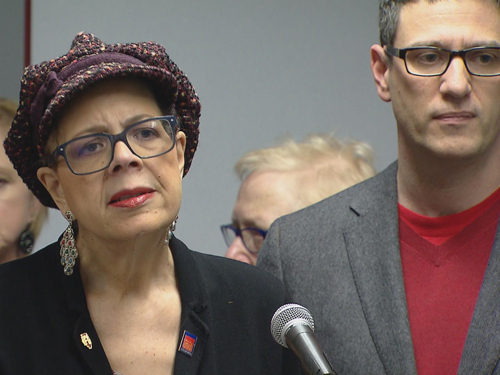EDITORIAL: It's time for a critical look at the way the leadership of the Chicago Teachers Union handled the contract negotiations and the last minute settlement that resulted in the worst contract since the CTU began collective bargaining in the late 1960s...
 Chicago Teachers Union President Karen Lewis and Vice President Jesse Sharkey at one of their regular press conferences.Since the leadership of the Chicago Teachers Union successfully pushed through a contract settlement within hours of the beginning of a planned strike (which would have begun the day after Columbus Day in October 2016), the members of the union, despite having voted in favor of the deal as it had been explained to them, have had nothing but unpleasant surprises. And by the end of February 2017, when they heard that the Board of Education might add three additional weeks of no school to the four "furlough days" already implemented, a growing number of the union's rank-and-file, who had hitherto trusted the leadership since Karen Lewis and her associates first took office in July 2010, were not only criticizing the leadership, but discussing how to challenge Lewis and those around her.
Chicago Teachers Union President Karen Lewis and Vice President Jesse Sharkey at one of their regular press conferences.Since the leadership of the Chicago Teachers Union successfully pushed through a contract settlement within hours of the beginning of a planned strike (which would have begun the day after Columbus Day in October 2016), the members of the union, despite having voted in favor of the deal as it had been explained to them, have had nothing but unpleasant surprises. And by the end of February 2017, when they heard that the Board of Education might add three additional weeks of no school to the four "furlough days" already implemented, a growing number of the union's rank-and-file, who had hitherto trusted the leadership since Karen Lewis and her associates first took office in July 2010, were not only criticizing the leadership, but discussing how to challenge Lewis and those around her.
Although there has been some attempt to obscure the facts and chronology of what is now obviously the worst contract in the collective bargaining history of the Chicago Teachers Union, as the unions members face the realities of pay freezes, then pay cuts (via furloughs), along with relentless attacks on teachers professionalism, the obfuscations have been obliterated. The previous contract had expired on June 30, 2015, but the union leadership agreed to continue negotiations through 2015 and almost through all of 2016. At each point, the union's members were assured that union plans for what it calls "revenue enhancement" combined with regular protest demonstrations by a dwindling number of union activists would result in a decent contract. But when the final deal was brought to the so-called "Big Bargaining Team" and then to the House of Delegates in October 2016, little was explained about what had been surrendered or never attempted.
The "Why" is still unknown and there is no reasons to speculate (over time, someone eventually talks about those last-minute things that made such a sellout necessary -- at least to the small leadership cadre now ruling the CTU.
But the "Who," "What," "When" and "Where" are very clear, and the most important of those is the "What".
The "What" is the fact that the CTU agreed to a four-year contract that included no raises for any of the union's members in the contract's first two years and minimal raises in the contract's final two years. The contract itself extends from July 1, 2015 through June 30, 2019, even though it wasn't finally voted on by the union and accepted by the Board until October 2016.
The monetary facts of the contract show that the raises over the contract's four years are the lowest of any contract period of four years in the history of CTU contracts. That history began when the union began negotiating written contracts (as opposed to "handshake" agreements with the city's mayor) in the late 1960s (at the same time when this reporter first began a Chicago teaching career -- one that was interrupted by some years of work against the Vietnam War -- at Crispus Attucks Elementary School in May 1969 (three months after I finished my BA at the University of Chicago, which I attended on scholarship).
When the four years of the previous contract (supposedly a "victory" because of the Chicago Teachers Strike of 2012) are added to the current one, the economic facts for all union members are clear: the lowest raises ever for that period. And union members need to be reminded that the earlier contract (which officially extended from July 1, 2011 through June 30, 2015) included a side deal (which was not made clear to the union's members when the deal was presented at the end of the first week of the 2012 strike) that surrendered the four percent raise that was supposed to be part of the previous contract. That contract had been negotiated by the previous union leadership, which the newer leadership had characterized as having "sold out." (When the facts are laid out, the question of how to characterize a "sellout" becomes more than a lexicographical exercise).

